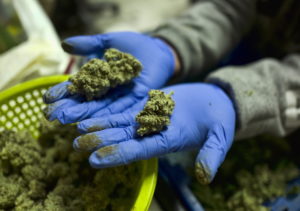Bills call for pot to be legal nationally

WASHINGTON — Bills that would legalize and tax marijuana at the national level, and provide opportunities for people convicted of federal pot crimes to clear their records, were introduced Tuesday in Congress.
The companion legislation in the House and Senate were introduced by Sen. Kamala Harris of California and New York Rep. Jarrold Nadler, the chairman of the powerful House Judiciary Committee. Both are Democrats.
“Times have changed — marijuana should not be a crime,” said Harris, who is running for president. “We need to start regulating marijuana, and expunge marijuana convictions from the records of millions of Americans so they can get on with their lives.”
The tax revenue from legalization would support job training, substance abuse treatment, literacy programs and other services for individuals and communities hit hard by drug enforcement. Some of the revenue would also support programs designed to help “socially and economically disadvantaged individuals” start their own marijuana businesses.
While support for marijuana legalization has gained traction in Congress it’s still a longshot that a bill will pass this session. Still, Nadler’s introduction means the issue is very likely to get a hearing before his committee.
Supporters of legalization hailed Nadler’s involvement as a clear sign of momentum.
“Never in American history has the chairman of the Judiciary introduced a bill to end federal marijuana criminalization,” said Justin Strekal, political director of the Washington-based National Organization for the Reform of Marijuana Laws. “At a time when the state you live in can determine whether cannabis can ruin your life or make you a millionaire, now more than ever we must end the national prohibition of marijuana.”
Eleven states and the District of Columbia have legalized marijuana since 2012 for so-called recreational use by people 21 and older. Illinois joined the list last month when that state’s governor signed legislation removing criminal penalties and allowing for expungement of past low-level pot convictions.
